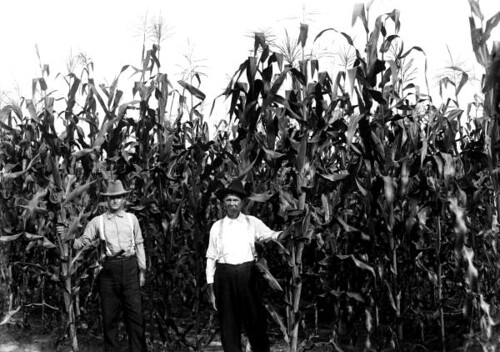click to enlarge, double click to reduce

Demonstration agent O.L. Mizelle in field of corn with farmer J.S. Howard: Bradford County, Florida by State Library and Archives of Florida, on Flickr
Corn based ethanol also destroys two stroke engines which raises costs and production cycles in other industries. Its rising consumption drives up food costs which proves devastating to developing countries, and in an era of rising debt, subsidization must be seriously questioned when alternatives are at hand. Corn prices, like wheat, have risen significantly in the last 5 years.
Demonstration agent O.L. Mizelle in field of corn with farmer J.S. Howard: Bradford County, Florida by State Library and Archives of Florida, on Flickr
One of the alternatives must be sugar cane based ethanol. It shares none of the issues that ethanol incurs. Sugar cane is multiple times more efficient than corn and can compete with oil at today's prices without subsidy. It is more inexpensive to grow, does not displace food stuffs, and is readily available on the open market.
The barriers to sugar cane are artificial. They are in the form of trade barriers to South American countries like Brazil that grow it in huge quantities. Hmmm. What to do?
Reference materials
The Economist. “Corn-based ethanol not cheap, not green.” News. Seattle PI, 2007. http://www.seattlepi.com/opinion/311225_ethanol12.html.
Gail the Actuary. “Corn-Based Ethanol: Is This a Solution?.” Energy. The Oil Drum, 2007. http://www.theoildrum.com/node/2615.
Gomes, Rafael Benevides Barbosa, Brazil's Big Tariff Problem with the United States (February 24, 2010). The Public Servant: A Student Publication of the George Bush School of Government and Public Service, Vol. 11, No. 4, 2010. Available at SSRN: http://ssrn.com/abstract=1558664
Philpott, Tom. “Unintended or not, the consequences were predictable | Grist.” Green energy. Grist, 2007. http://www.grist.org/article/corn-based-ethanol-the-biggest-greenwash-ever/.
I like your article, very good insight on the importance of free trade for the ethanol industry. Brazilian gas stations are already benefiting from cheap/clean sugar cane ethanol. The average price for a gallon of ethanol in Brazil is usually 15-35% cheaper than gasoline, depending on the state and on which season of the year we are talking about. The car industry has also adapted. Today, nearly every car in Brazil runs on both gasoline and ethanol.
ReplyDeleteThank you sir. Unfortunately all this has been known for years.
ReplyDelete